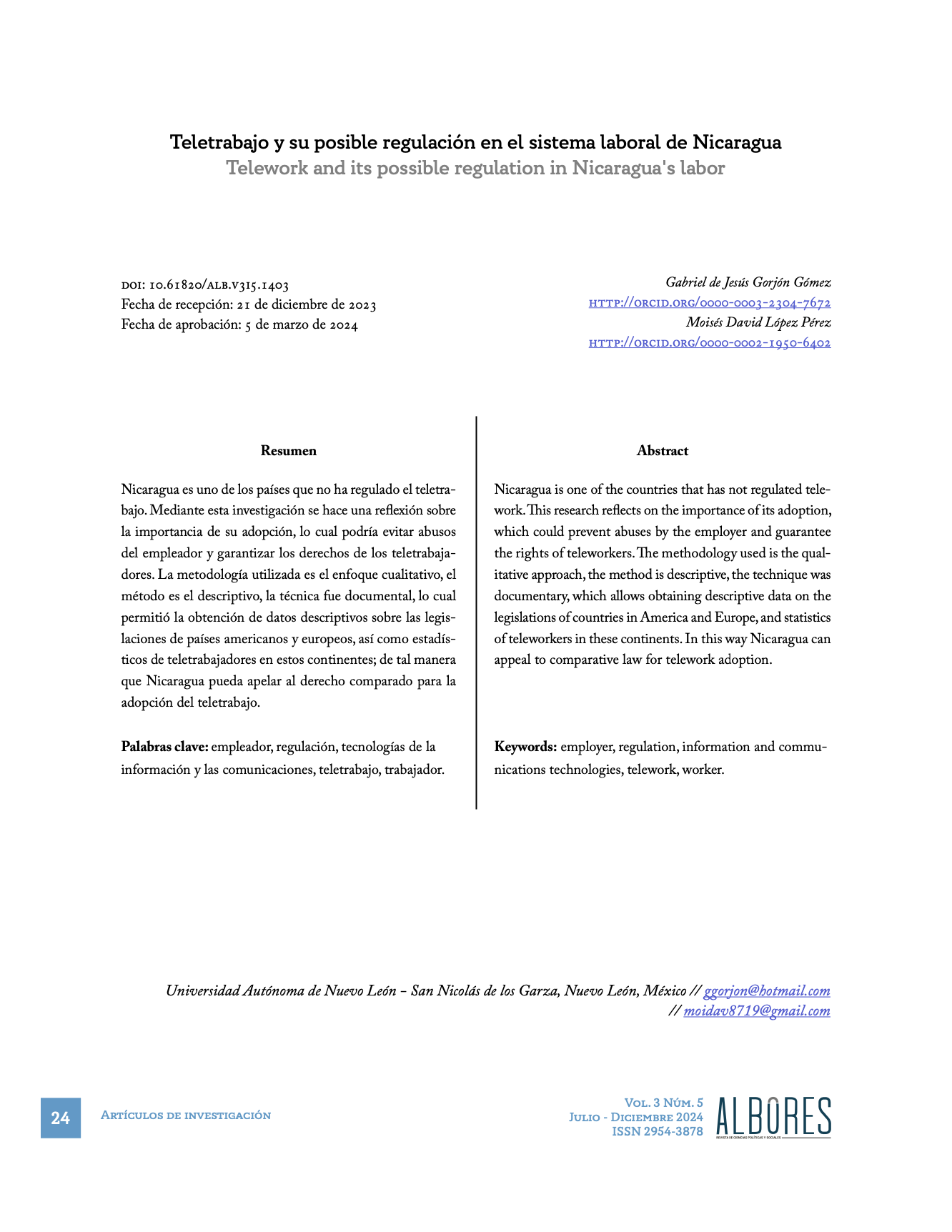
Keywords
regulation
information and communications technologies
telework
worker
Abstract
Nicaragua is one of the countries the Latin America that has not promoted a bill to regulate telework. Regulating telework would prevent abuses by employers and guarantee the rights of these workers. It is considered relevant to demonstrate the importance of regulating this modality in Nicaragua, for this research is carried out with a qualitative approach, supported by the descriptive method and using the documentary technique. This article is valuable among other reasons because it presents elements that should be considered by the state of Nicaragua for the adoption of telework in its labor system.

This work is licensed under a Creative Commons Attribution-NonCommercial-ShareAlike 4.0 International License.
Copyright (c) 2024 Albores
Similar Articles
- Lourdes Leticia Machado Balbuena, Williams Chavero Jiménez, Juan Pedro Horta Sánchez, Mariana Itzel Nava Rodríguez, Impact of information and communication technology (ICT) on the child and adolescent population during the COVID-19 pandemic: Analysis from a bioethical perspective , Albores: Vol. 3 No. 4 (2024): Albores. Revista de Ciencias Políticas y Sociales
- Juan Pablo Rodríguez Huerta, Water management: a comparative analysis on water policies between Cape Town (2018) and Monterrey (2022) , Albores: Vol. 2 No. 3 (2023): Albores. Revista de Ciencias Políticas y Sociales
- Claudia Anait Ocman Azueta, Jaylin Guadalupe Negrete Ortiz, Overview of human mobility and climate change in the countries of Northern Central America. International, regional and state actions , Albores: Vol. 3 No. 4 (2024): Albores. Revista de Ciencias Políticas y Sociales
- Mariana Chavez Castañeda, Betsabée Fortanell Trejo, Daniel Martínez Sahagún, Multidimensional model for the study of native digital media , Albores: Vol. 3 No. 4 (2024): Albores. Revista de Ciencias Políticas y Sociales
- Oscar Basave Hernández, María Ysabel Navarrete Radilla, Claudia Arroyo Salinas, Experiencies of Sociology Students who worked during the COVID-19 pandemic , Albores: Vol. 3 No. 4 (2024): Albores. Revista de Ciencias Políticas y Sociales
- Malinka Enya Aceves Martínez, Cultural Synchrony: K-pop, a Lifestyle for Young Queretaro Residents , Albores: Vol. 3 No. 4 (2024): Albores. Revista de Ciencias Políticas y Sociales
- Iván Patricio Ríos Sangucho, Discourses of inclusion, difference and normalization: The concept of inclusion in the construction of people with disabilities , Albores: Vol. 3 No. 5 (2024): Albores. Revista de Ciencias Políticas y Sociales
- José Pablo Castañeda Castaños, The impact of industrialization on the lowest paid workers , Albores: Vol. 1 No. 1 (2022): Albores. Revista de Ciencias Políticas y Sociales
- María Verónica Murguía Salas, Ana Elizabeth Jardón Hernández, Memories of the COVID-19 pandemic. Experiences of the indirect workers of the Universidad Autónoma del Estado de México , Albores: Vol. 2 No. 3 (2023): Albores. Revista de Ciencias Políticas y Sociales
- Alberto Castro Valles, Maria Nieves González Valles, Karlotta Carrasco Castro, Perceptions of social rejection, emotional exhaustion, and substance consumption of sex workers in Ciudad Juarez , Albores: Vol. 3 No. 5 (2024): Albores. Revista de Ciencias Políticas y Sociales
You may also start an advanced similarity search for this article.
Most read articles by the same author(s)
- Alfonso Andres Cortez Lara, Ivan Alejandro Martínez Zazueta, Drought, brewing megaproject and the citizen water agenda in Baja California , Albores: Vol. 3 No. 5 (2024): Albores. Revista de Ciencias Políticas y Sociales
- María Teresa Valdés Hernández, Self-employment as a way of personal empowerment: the case of the uaq University Market producers , Albores: Vol. 2 No. 2 (2023): Albores. Revista de Ciencias Políticas y Sociales
- Genaro García Guzmán, Karen Paulina Muñoz Arellano, Water, city and neo-extractivism: introductory exercises on de-blackboxing the hydrosocial cycle , Albores: Vol. 2 No. 2 (2023): Albores. Revista de Ciencias Políticas y Sociales
- Michele Nicole Delgado Calderón, Stereotyping of women in the electoral campaign of Jeanine Añez , Albores: Vol. 2 No. 3 (2023): Albores. Revista de Ciencias Políticas y Sociales
- Ricardo Ordaz Vega, An interpretation of poverty in the Encyclical Letter Fratelli Tutti , Albores: Vol. 3 No. 4 (2024): Albores. Revista de Ciencias Políticas y Sociales
- Daniel Rojas Navarrete, The Political Craft: The Ruling Elite in Mexico (1946-2020) , Albores: Vol. 2 No. 2 (2023): Albores. Revista de Ciencias Políticas y Sociales
- Miguel Moreno Plata, The challenges of environmental governance in the face of the risk and uncertainty associated with climate change , Albores: Vol. 1 No. 1 (2022): Albores. Revista de Ciencias Políticas y Sociales
- Carla Angelini, On the dictatorship of happiness. A manifesto , Albores: Vol. 2 No. 2 (2023): Albores. Revista de Ciencias Políticas y Sociales
- Malinka Enya Aceves Martínez, Cultural Synchrony: K-pop, a Lifestyle for Young Queretaro Residents , Albores: Vol. 3 No. 4 (2024): Albores. Revista de Ciencias Políticas y Sociales
- José Antonio Carrera Barroso, Pedro Rafael Constantino Echeverría, Political transnationalism and the struggle for representation: #RedVotoChilango, a transnational network , Albores: Vol. 2 No. 2 (2023): Albores. Revista de Ciencias Políticas y Sociales

